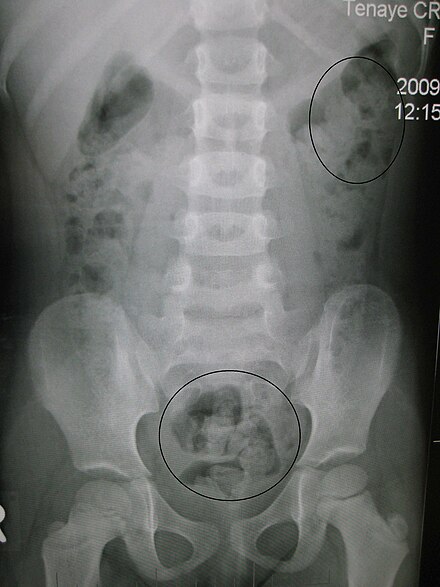Constipation
Constipation, also known as costiveness or dyschezia, is a common bowel dysfunction characterised by infrequent or difficult bowel movements. It presents with symptoms such as abdominal pain, bloating, and the sensation of incomplete evacuation. Constipation can lead to complications such as haemorrhoids, anal fissures, and faecal impaction. .

Signs & Symptoms
Constipation is typically defined by fewer than three bowel movements per week. Other associated symptoms include:
- Straining during bowel movements
- Hard stools
- Abdominal pain and bloating
- Excessive time needed to pass a bowel movement
- Sensation of incomplete bowel evacuation
Causes
Constipation can be categorised into congenital, primary (functional), and secondary causes. Primary constipation, the most common type, is often multifactorial and related to dietary habits, fluid intake, and physical activity. Secondary causes include medication side effects, endocrine and metabolic disorders, and structural abnormalities.
Diet
A low-fibre diet, inadequate fluid intake, and certain dietary choices can exacerbate constipation. Dietary fibre helps to decrease colonic transit time and increase stool bulk, thereby facilitating easier bowel movements.
Medications
Many medications list constipation as a side effect, including opioids, diuretics, antidepressants, and calcium channel blockers. For instance, up to 90% of opioid users experience constipation.
Medical Conditions
Various medical conditions can lead to constipation, such as hypothyroidism, diabetes, Parkinson's disease, and celiac disease. Structural issues like colorectal cancer and anal sphincter malformations can also obstruct stool passage.
Psychological Factors
Voluntary stool withholding due to fear of pain or public restrooms is common, particularly in children. Early intervention is essential to prevent complications like anal fissures.
Diagnosis
Diagnosis typically relies on patient history and symptoms. Constipation is defined by three or fewer bowel movements per week, accompanied by symptoms like bloating and abdominal pain.
Examination
A thorough physical examination, including an abdominal and rectal exam, helps assess stool burden and detect any physical abnormalities.
Diagnostic Tests
Imaging and laboratory tests may be necessary for those with alarm signs like weight loss, rectal bleeding, or a family history of colon cancer. Tests include abdominal X-rays, colonoscopy, and specific laboratory tests like thyroid function tests.

Treatment
Treatment focuses on the underlying cause and symptom relief. Common measures include increased fluid intake, dietary fibre, and regular exercise.
Fibre Supplements
Soluble fibre supplements, such as psyllium, are generally recommended as the first-line treatment. They help increase stool bulk and ease bowel movements.
Laxatives
If necessary, laxatives such as polyethylene glycol can be used. Stimulant laxatives are typically reserved for cases where other treatments fail.
Enemas and Physical Intervention
Enemas may provide immediate relief for rectal stool, while manual disimpaction may be required for severe cases of faecal impaction.
Surgical Intervention
In refractory cases, surgical options like colectomy may be considered, although they come with risks such as abdominal pain and infections.
Epidemiology
Constipation is a prevalent condition affecting 2-30% of the general population. It is more common in women, the elderly, and children. In the UK, chronic constipation leads to significant healthcare costs and frequent physician visits.
Special Populations
Children
Approximately 3% of children experience constipation, often related to life changes like toilet training or dietary transitions.
Postpartum Women
Constipation is common in the postpartum period, affecting around 25% of women due to factors like perineal trauma and haemorrhoids.
Self-assessment MCQs (single best answer)
What is the minimum number of bowel movements per week that typically defines constipation?
Which of the following is a common complication of constipation?
Which category of constipation is related to dietary habits and fluid intake?
Which medication is most likely to cause constipation as a side effect?
Which of the following is NOT a common symptom of constipation?
What dietary component is essential in decreasing colonic transit time and increasing stool bulk?
Which diagnostic tool is useful for assessing stool consistency and diagnosing constipation?
What is the first-line treatment for constipation involving dietary changes?
Which population is particularly affected by constipation due to life changes like toilet training or dietary transitions?
Which medical condition is NOT typically associated with causing secondary constipation?
Dentaljuce
Dentaljuce provides Enhanced Continuing Professional Development (CPD) with GDC-approved Certificates for dental professionals worldwide.
Founded in 2009 by the award-winning Masters team from the School of Dentistry at the University of Birmingham, Dentaljuce has established itself as the leading platform for online CPD.
With over 100 high-quality online courses available for a single annual membership fee, Dentaljuce offers comprehensive e-learning designed for busy dental professionals.
The courses cover a complete range of topics, from clinical skills to patient communication, and are suitable for dentists, nurses, hygienists, therapists, students, and practice managers.
Dentaljuce features Dr. Aiden, a dentally trained AI-powered personal tutor available 24/7 to assist with queries and provide guidance through complex topics, enhancing the learning experience.
Check out our range of courses, or sign up now!


